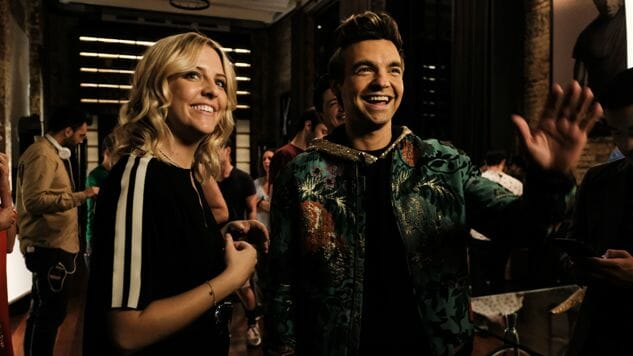Comedy Central’s New Showbiz Satire The Other Two Balances Fame and Family
Photos by Jon Pack, courtesy of Comedy Central
The Other Two is a show about balance. You can’t have a show that’s just about the idiocracies of fame because there won’t be any thing to ground it. You also can’t exactly have a show that’s just about two broken people, since it’ll disappear among every other comedy that’s about exactly that. That’s why The Other Two is about both.
In the show’s inaugural season, struggling actor Cary (Drew Tarver) and former dancer and now unemployed interior designer Brooke (Heléne Yorke) are suddenly thrust into a spotlight when their younger brother ChaseDreams (Case Walker) becomes a viral sensation. Now that Chase is famous, Cary and Brooke have to decide if they’re going to use his new-found fame for their own gain. Across the 10-episode first season, the answer seems to be yes, but with some trepidation and a lot of absolute misunderstandings about the entertainment industry they’re suddenly a part of.
This isn’t your typical fame satire, however, but a balance between two concepts. The show, created by former Saturday Night Live head writers Chris Kelly and Sarah Schneider, knows that the industry is chaotic and ripe for comedy, but doesn’t stick its nose up at it. Kelly and Schneider also understood that at the heart of the story, there still needed to be a character-driven, intimate narrative that kept audiences coming back.
“We were kind of between two ideas,” Schneider said during a recent Comedy Central press event. “We wanted to write stories about being in your 20s and being in New York, as we were, and so, we can make a show out of just that, but we liked having a larger premise because it let us tell bigger, slightly sillier stories about characters that were a little broader.”
So while Cary and Brooke are dealing with the idiosyncrasies of entertainment in 2019, they’re also figuring out who they are as people, why they’re not successful but their teenage brother is, the secret and trauma that’s slowly tearing apart their family, and if, despite everything, they can still protect their brother from what is clearly a toxic industry. Through it all Tarver and Yorke balance physical comedy with quiet moments of drama. It’s a mix that would’ve been a lot to handle, but Schneider, Kelly and the rest of the writing team make it work.
“There are a lot of things in the show that are very pop culture-y and celeb-y, but we didn’t want it to consume the show,” Kelly said. “We try to make sure that if we were to put Cary on Watch What Happens Live, for example, it exposed his insecurities.”
This does happen. In one of the show’s cameo-laden scenes (Andy Cohen and Patrick Wilson show up here, but the audience is also graced with Wanda Sykes and a running joke about Justin Theroux having a motorcycle as a toilet, which the showrunners reassure he was totally on board for), Cary has to worry about his physical appearance and his success compared to his mother’s, played by Molly Shannon, who is also a guest on the show that day and has also parlayed her relationship with her son into a children’s book-writing career.
It’s tough to go into the minutiae of the characters’ issues without spoiling some of the show’s best jokes—and there are a lot of them—but in figuring out the balance The Other Two had to strike, Kelly and Schneider understood that it couldn’t be about Chase and fame. It had to be about the titular “other two.”
“We never wanted to just be doing pop culture jokes; it was for a reason,” Kelly continued. “Our goal in the writers room was, if you took away Chase and you deleted him as a character and there was no fame, all these characters would still be going through the same struggles. So Cary needed to be more comfortable in his own skin, he struggles with his sexuality and his identity. Brooke was always going to have to figure out, ‘What now? I had a huge success at 12 and now I’m 30. Now what?’”

Even if the show is mainly about Cary and Brooke, that doesn’t mean there isn’t room to poke fun at entertainment. Ken Marino plays Chase’s oddly sweet manager Streeter (no relation to infamous Bieber manager Scooter Braun), who puts Chase through the ringer, wrapping his neck to keep the adam’s apple down or feeding him a diet of nothing but raw eggs (something the showrunners said Braun did for Bieber while he was on SNL, oddly). Streeter is also a savvy professional who looks at Chase not just as a client, but as a friend.
-

-

-

-

-

-

-

-

-

-

-

-

-

-

-

-

-

-

-

-

-

-

-

-

-

-

-

-

-

-

-

-

-

-

-

-

-

-

-

-








































